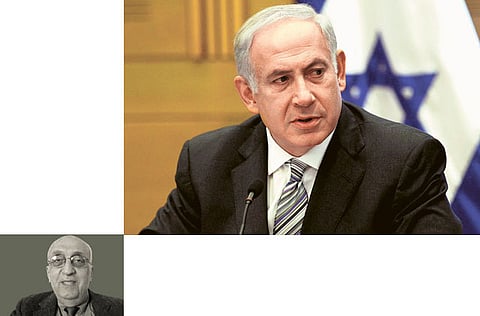Netanyahu walking a thin line
Deliberate procrastination while expanding colonies is fast making a two-state solution unviable

When Benjamin Netanyahu was in Washington earlier this month, he startled his huge audience — over 10,000 American Jews, Congressmen and US officials led by President Barack Obama — at the three-day American Israel Public Affairs Committee (AIPAC) annual conference with his unbalanced and sometimes exaggerated pronouncements.
"Iran's nuclear programme continues to march forward," the Israeli prime minister complained. "My friends, Israel has waited and waited for the international community to resolve this issue. We've waited for diplomacy to work. We've waited for sanctions to work. None of us can afford to wait much longer. As prime minister of Israel, I will never let my people live in the shadow of annihilation."
His diatribe was startling. It even triggered a thought which may shock Netanyahu. Isn't this what the Palestinians have been saying all along, urging Israelis to pull back from the Occupied Territories, the remaining portion of the Holy Land that has been usurped since 1967.
No one, including the western powers and especially the US, has been calling on Netanyahu to implement the UN Partition scheme which has divided Palestine unequally, unfairly giving the Israelis a larger and richer portion of the strategic country on the eastern Mediterranean.
Hardly a few weeks passed since this infamous Netanyahu declaration, the UN Human Rights Council condemned last Thursday Israel's planned construction of new colonies for Jewish colonists in a large portion of the West Bank and occupied east Jerusalem.
The council emphasised that the Israeli plans had undermined the decades-long peace process and posed a threat to the two-state solution and the creation of a contiguous and independent Palestinian state. About 500,000 Israeli colonists, including Israeli Foreign Minister Avigdor Lieberman, and 2.5 million Palestinians live in the West Bank and occupied east Jerusalem.
Fact-finding mission
What Netanyahu conveniently forgets is that these colonies were also considered illegal by the International Court of Justice, the highest UN legal body for disputes, and are believed to pose a serious problem for establishing a viable Palestinian state.
And when the UN Council declared last Friday that it is planning to send a fact-finding mission to investigate these colonies, the Israeli government severed all ties with the UN body and promised to bar any UN team from entering Israel or the West Bank.
The UN resolution was adopted by the 47-member council by 36 votes in favour and 10 abstentions. Disappointingly, the US was the only member to vote against the resolution. The Palestinians and Israelis are not members of the council.
Obama may have been concerned that joining the international outcry may harm his presidential aspirations but he, like Netanyahu, should consider what Haaretz columnist Akiva Eldar wrote this week: "Were Israel to have a more rational government, it would see the Palestinian actions, as what they are, a Palestinian recognition of Israel within the 1967 borders."
As this right-wing Israeli government continues to procrastinate, regrettably with backing from some short-sighted US officials, the future would not be promising for both sides, but doubtful for the Israeli side in the long run.
Already another UN body, the Committee on the Elimination of Racial Discrimination, has labelled the recent Israeli draft law that would move 30,000 bedouins living in the Negev to permanent, existing Bedouin communities as discriminatory as it "would legalise the ongoing policy of demolitions and forced displacement of the indigenous bedouin communities."
Rallies against Israel's aggressive policies are expanding in both Israel and the US. Hundreds of Israelis marched in Tel Aviv last Saturday in protest against a possible Israeli strike on Iran's nuclear facilities. A recent opinion poll released by the Brookings Institution reported that "only one in four Americans favour Israel conducting a military strike against Iran's nuclear programme while seven in ten favour instead the US and other major powers continuing to pursue negotiations with Iran."
On occasion of Land Day — on March 30 — thousands of activists are scheduled to hold commemorative protests against Israeli confiscation in 1976 of Arab land in northern Israel in order to create Jewish majorities in these Arab-dominated areas. This year the international focus will be focused on occupied Jerusalem where "ethnic cleansing" is reportedly ongoing,
Considering all these earth-shaking developments, it is not far-fetched to expect Netanyahu's days to be numbered. A prominent Israeli columnist concludes, "There is no denying, however, that settlement [colony] construction, Palestinian disunity, and other factors are fast rendering the two-state concept impracticable" — a position that many Palestinians favour; hence their chant for a one-state solution.
George S. Hishmeh is a Washington-based columnist. He can be contacted at ghishmeh@gulfnews.com



